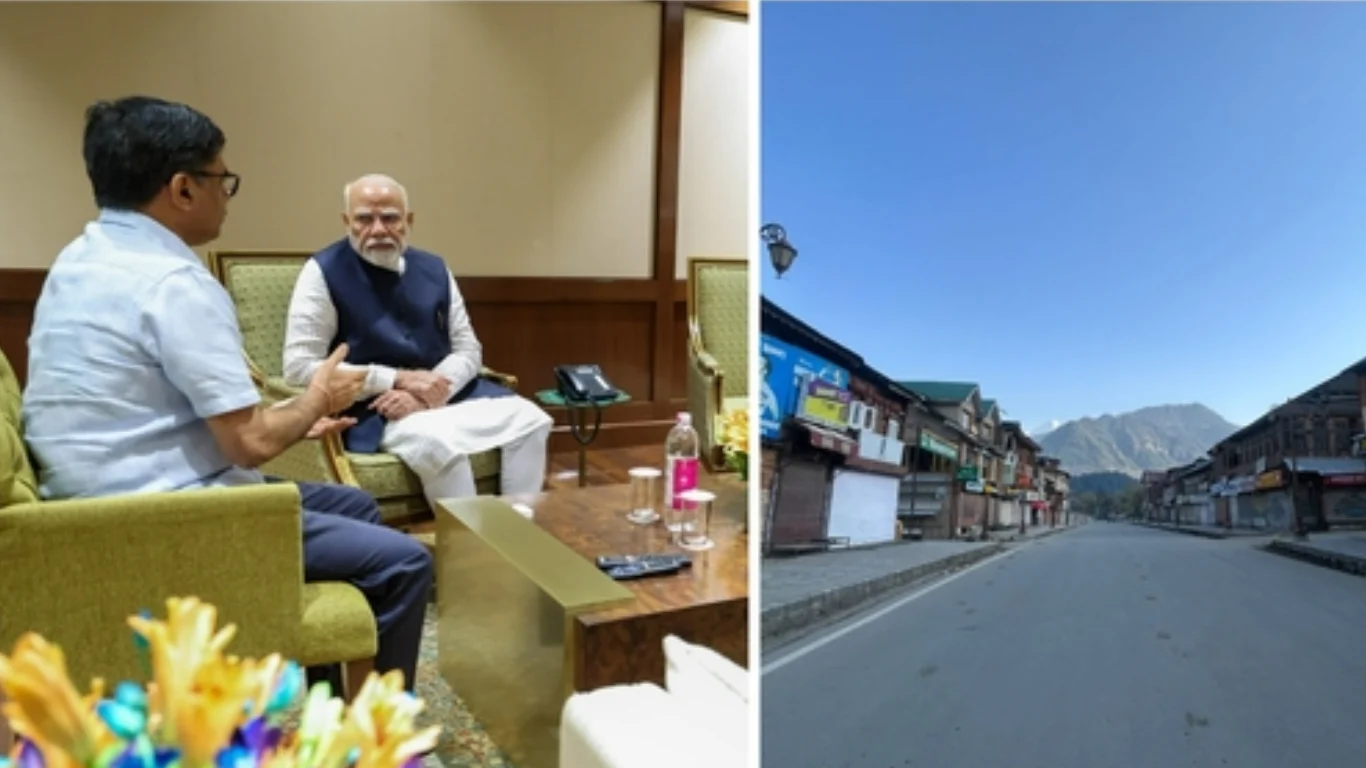
The serene town of Pahalgam in Jammu and Kashmir, known for its breathtaking landscapes and popular tourist spots like the Baisaran meadow—often dubbed “mini Switzerland”—was tragically thrust into the global spotlight on April 22, 2025. A brutal terrorist attack shook the region when heavily armed militants opened fire on civilians at the Baisaran tourist site, killing at least 26 people, most of them tourists from other parts of India. The attack, the deadliest of its kind on civilians in the Valley in years, has prompted a high-level and immediate response from India’s top leadership, led by Prime Minister Narendra Modi and Union Home Minister Amit Shah.
The incident sent shockwaves across the country and drew swift condemnation and urgent action from political leaders, both in India and abroad. As the nation reeled from the horror, the Indian government demonstrated rapid crisis management, with visible and decisive moves from the top echelons of power.
Modi’s Urgent Return and Crisis Meeting
Prime Minister Modi, who was on a high-level state visit to Saudi Arabia at the time of the attack, immediately altered his itinerary. He skipped a scheduled diplomatic dinner with Saudi Crown Prince Mohammed bin Salman and cut short his trip, flying back to New Delhi a day earlier than planned. The decision to forgo critical diplomatic engagements underscored the gravity of the situation and Modi’s determination to take direct control of the national response.
As soon as he landed in Delhi early Wednesday morning, PM Modi held a high-level meeting at the airport itself. Present at the emergency briefing were National Security Advisor Ajit Doval, External Affairs Minister Dr. S. Jaishankar, and Foreign Secretary Vinay Kwatra. The Prime Minister was briefed on the unfolding situation, the preliminary investigation, and the security protocols being put in place. Sources confirmed that the Prime Minister directed all national security and intelligence agencies to ensure no stone is left unturned in the pursuit of those responsible.
Public Assurance and International Diplomacy
In a strongly worded statement, Prime Minister Modi condemned the attack, describing it as a “cowardly act of terror against peace and unity.” He expressed heartfelt condolences to the families of those who lost their lives and assured the public that justice would be swift and uncompromising.
“This is not just an attack on tourists—it is an attack on the very soul of our nation,” he said. “We will find those responsible and hold them accountable. Terror will not break our spirit.”
Modi’s response was echoed by a chorus of international voices. U.S. President Donald Trump, along with the United Nations Secretary-General António Guterres, issued statements condemning the violence. Leaders from the European Union, Australia, and Southeast Asian nations also expressed their solidarity with India, affirming support for its fight against terrorism.
Home Minister Shah Heads to Kashmir
While Modi was en route to Delhi, Home Minister Amit Shah wasted no time in heading to Jammu and Kashmir. Upon arrival, he was received by Lieutenant Governor Manoj Sinha, and together, they visited the attack site and met with local law enforcement and military officials. Shah’s presence served both operational and symbolic purposes—demonstrating the central government’s commitment to both justice and the safety of the region’s civilians.
Sources from the Ministry of Home Affairs indicated that Shah was briefed on ongoing counter-terror operations, including the search for the attackers and any remaining threats in the area. Several suspects were detained for questioning, and intelligence inputs are being scrutinized to prevent any further escalation.
Cross-Party Reactions and Political Unity
Across the political aisle, condemnation was swift and unified. Leader of the Opposition Rahul Gandhi personally reached out to Home Minister Amit Shah to discuss the situation and offered his support for any bipartisan steps needed to restore peace in Kashmir. Gandhi also called for greater accountability and transparency in the response, while urging political leaders to avoid politicizing a national tragedy.
Other opposition figures, including Priyanka Gandhi and Arvind Kejriwal, expressed solidarity with the victims’ families and commended the swift action by central and local authorities. Chief Minister Omar Abdullah called the attack “one of the darkest days in the region’s recent history,” emphasizing the need for a renewed commitment to security reforms in the Valley.
The Aftermath: Security and Civilian Impact
In the wake of the attack, Indian security forces launched a massive cordon-and-search operation in and around Pahalgam. Army units, paramilitary forces, and local police established checkpoints, and drones were deployed to monitor dense forested areas that could serve as terrorist hideouts.
Authorities also activated emergency evacuation plans for stranded tourists. Additional flights were arranged from Srinagar, and helplines were set up to assist travelers and their families. A temporary curfew was imposed in parts of Pahalgam to ensure order and prevent the spread of panic.
The attack has deeply impacted tourism in the region, with bookings being cancelled en masse. Many travelers cut their visits short and returned home, citing fears over safety. Schools were shut as a precautionary measure, and local businesses in the area observed a voluntary bandh in mourning.
The Resistance Front Claims Responsibility
Early investigation reports indicate that the attack was orchestrated by The Resistance Front (TRF), a proxy organization of the Pakistan-based Lashkar-e-Taiba. TRF released a statement claiming responsibility, citing the alleged settlement of over 85,000 outsiders in Jammu and Kashmir as their motive. Officials have neither confirmed nor denied this claim but have reiterated that every angle will be thoroughly investigated.
Intelligence agencies are analyzing the attackers’ routes, weapon supplies, and possible cross-border links. Forensics teams recovered shell casings and other evidence, which have been sent for examination. Officials also recovered electronic devices that could hold clues about the attackers’ planning and network.

















